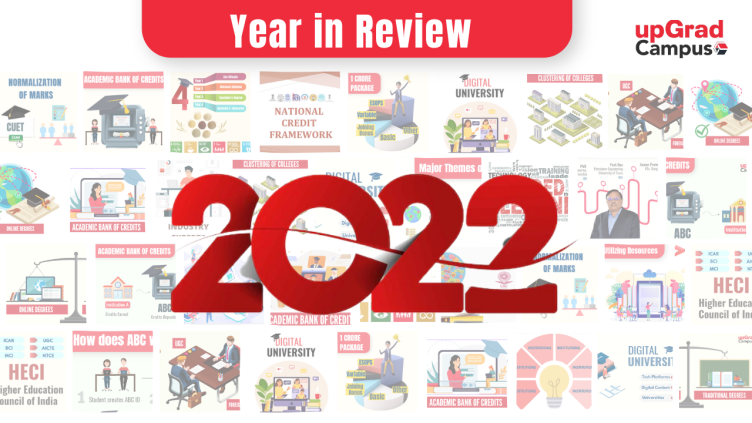The Year in Review: Higher Education Trends of 2022
On January 2, 2023
Dear Readers,
The team at upGrad Campus extends our heartfelt wishes for a joyous and prosperous New Year. May 2023 be a year of growth, success, and positive transformation for you. We hope that the blessings and opportunities of the new year will be plentiful for you.
Thank you for your continued support and engagement with our weekly newsletter. We are grateful for your valuable time and attention and look forward to continuing to provide top-quality content and service in the coming year.
The upGrad Campus Weekly Newsletter was initiated to inform the readers about Higher education institutions (HEIs) and their happenings within the higher education ecosystem. We have had the pleasure of publishing 40 editions thus far, providing updates on various policies, programs, surveys, steps, and key developments with the invaluable support of more than 9,500 subscribers.
In this annual review newsletter, we have compiled a summary of some of the key developments in India’s higher education system during 2022, along with links to our newsletters covering these developments in more detail.
- Changes to Higher Education in India
The University Grants Commission(UGC) proposed several changes to higher education, including the adoption of Indian knowledge systems, the switch to 4-year undergraduate programs, and the publication of textbooks in Indian languages. The Union Education Minister has emphasized the importance of industry collaborations, and the AICTE has suggested the adoption of hybrid learning. These proposals aim to improve and modernize higher education in India.
- The Merger of Regulatory Bodies and Examinations
The University Grants Commission (UGC), All India Council for Technical Education (AICTE), and National Council for Teacher Education (NCTE) were merged into a single Higher Education Commission of India (HECI). This merger was intended to streamline the regulation of higher education in India.
The All India Council for Technical Education (AICTE) has a new chairman, Prof. TG Sitharam. This leadership change may bring new priorities and initiatives to the organization. The entrance exams like NEET and JEE were also proposed to be merged into one single entrance exam- CUET. To provide a more accurate assessment of student abilities, CUET-UG’ Normalized’ Marks To Ensure Level Field.
- Implementation of the Academic Bank of Credits (ABC) System
The University Grants Commission (UGC) has made the Academic Bank of Credits (ABC) system mandatory for higher education institutions. The ABC system allows students to accumulate credits from different sources and apply them towards their degree program. This system is intended to provide greater flexibility and convenience for students pursuing their education.
- The National Credit Framework (NCrF)
The National Credit Framework (NCrF) is a framework that has been proposed to democratize education in India. The NCrF aims to make education more accessible and affordable for students by allowing them to accumulate credits from various sources and apply them towards their degree program.
- Recognition of Online Degrees
After UGC announced that it was open to the 2-degrees concept, online degrees were also recognized as being on par with regular degrees. This change is intended to acknowledge the increasing importance of online education and its role in providing students with access to quality education. UGC also recognized the potential of digital universities to contribute to the growth and development of online education in India.
- Clustering of Colleges for Multidisciplinary Research
The UGC had proposed the clustering of colleges to promote multidisciplinary research. This approach is intended to encourage collaboration and exchange of ideas among faculty and students from different disciplines, leading to greater innovation and progress in research.
- Salary Issues and Employment in Higher Education
We tried to demystify the concept of "fat salary packages" and addressed the issue of low salaries offered for engineering graduates that have not reached inflation growth. It was sure a wake-up call for many students and HEIs to focus on skill-based education.
- Foreign University Campuses in India
We had covered that Foreign university campuses may soon be allowed to enter the Indian education ecosystem, with the possibility of having freedom on curriculum. This indeed was achieved, and India is reportedly open to global education investments, indicating a willingness to foster collaborations and partnerships with international institutions and organizations.
- NAAC, NEP and upGrad Campus
The University Grants Commission (UGC) plans to provide financial assistance to universities that have received accreditation from the National Assessment and Accreditation Council (NAAC). Through the National Education Policy (NEP). The UGC is also in the process of revising higher education in India to keep it current and relevant to the needs of the job market.
- UGC, NAAC on Mental Health and Critical Thinking
The NAAC has announced that it will require critical thinking to be included in college papers in order to promote critical thinking skills and encourage students to think more deeply. The UGC has also expressed concern about student mental health and the need for universities to provide support and resources for students struggling with mental health issues.
- Surveys and Rankings and Analysis
Several Indian institutions have been recognized in the QS World University Rankings, a prestigious list that ranks universities from around the world. We also extensively covered the National Achievement Survey (NAS), a nationwide assessment of school students in India conducted by the NCERT. AICTE survey has found that engineering students in India are struggling with math, which was once considered a strength of the country. AICTE also has urged students to upgrade their digital skills, as technology continues to play an increasingly important role in various fields.
- Focus on Industry-Academia Collaborations
The UGC has implemented initiatives to improve the quality and relevance of higher education in India, including sourcing insights from the industry and allowing various HEIs to source content for online degrees externally. Ed-tech companies were also allowed to collaborate with universities to produce online content, and the UGC suggested that universities could hire industry experts as "professors of practice." Along with these, Internships were also made a mandatory part of the academic curriculum to provide students with real-world experience.
We also published an exclusive newsletter detailing all of the initiatives we at upGrad Campus are taking as part of our mission to transform Indian campuses into Next-Gen institutions.
If you are a part of a college/university and want to digitally transform your classrooms, kindly mail us at campus.sales@upgrad.com


